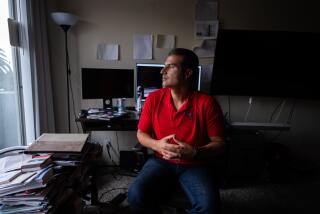Engineer Held in Illegal ‘Star Wars’ Sales : Crime: He is arrested by U.S. Customs agents and charged with trying to sell restricted data. Exports to four Japanese firms are also under investigation.
U.S. Customs agents posing as brokers for South African businessmen arrested a Los Angeles engineer who has been charged with illegally attempting to sell them technical data from a restricted Strategic Defense Initiative missile research project, federal authorities said Friday.
Prosecutors said that the engineer, Ronald J. Hoffman, 51, was also under investigation for exporting or agreeing to export similar data to at least four Japanese industrial firms over the last four years. Federal authorities said they were uncertain whether any of the Japanese firms were aware that the technology was being sold illegally.
Assistant U.S. Atty. William F. Fahey said that documents, computer records and facsimile machine files seized Thursday night during a search of Hoffman’s Beverly Glen home indicated that the engineer’s “Star Wars” sales to the Japanese may have netted him “hundreds of thousands of dollars.”
In a 52-page affidavit filed in U.S. District Court in Los Angeles, authorities said they were also investigating allegations that Hoffman, working through his defense contracting firm, Plume Technology, illegally exported or agreed to sell missile software systems to firms in West Germany and Italy and also to Israel’s Ministry of Defense. Fahey said that Hoffman had boasted of being in contact with the head of the Israeli government’s missile program.
In Washington, Customs spokesman David Hoover explained that the sting operation was part of “Operation Exodus,” a continuing federal effort to stem the flow of high-technology data and munitions from the United States to Eastern Bloc nations, Cuba, North Korea and South Africa.
Hoffman was arrested Thursday afternoon at a hotel near Los Angeles International Airport moments after he accepted a $150,000 check from a Customs agent. Several minutes earlier, according to the affidavit, two agents watched as Hoffman placed a cardboard box containing SDI computer software into a Federal Express mail slot.
On Friday, U.S. Magistrate Robert M. Stone ordered Hoffman held on $500,000 bail. Hoffman, a tousled-haired man who wore sandals with his blue prison uniform, said little as he stood beside his defense attorney, Roger Rosen. Hoffman was expected to post bond and be released later in the day.
Hoffman was charged with attempting to sell a computer software system known as “Contam,” that is being developed as part of SDI research. By examining the exhaust trail left behind by launched missiles, the software could enable weapons tracking stations to “identify what type of rocket or missile was launched and how best to counteract it,” authorities said in the affidavit.
“We consider this the illegal export of some of our most precious national commodities,” Fahey said.
Fahey declined to say whether authorities had contacted South African officials before the agents posed as brokers for that country. Henk Roodt, the South African consul in Beverly Hills, also declined to comment.
But in a federal courtroom, awaiting Hoffman’s bail hearing Friday, one federal agent laughed: “We took it out of Lethal Weapon (II).” The reference was to a 1989 action film that portrayed South African diplomats as murderers and smugglers.
In their disguises as brokers for South Africa, authorities said, Customs agents Steven J. Bosseler and Jorge Urquijo struck a deal with Hoffman to pay him $150,000 in return for his sale of the computer data. To avoid federal laws restricting the sale of SDI equipment to South Africa, Hoffman agreed to ship the software to Bonn, West Germany, where the agents told him the material would then be transferred to South Africa.
According to the affidavit, authorities were first tipped off about Hoffman’s activities by a man whose wife worked for the engineer at a Century City firm, the Science Application International Corp. Hoffman resigned from that company in December, 1989, authorities said, after executives with the firm learned about his Japanese dealings.
Hoffman is charged with violating U.S. export laws by exporting SDI and missile research materials without proper authorization. According to the affidavit, Hoffman failed to obtain proper State Department clearances before he entered into agreements with the Japanese companies.
Between April 26 and May 29, according to authorities, federal undercover agents met with Hoffman five times, persuading him to sell them Contam software. Customs agent Bosseler said in the affidavit that he told Hoffman he represented a South African client who “was in the aerospace business and was attempting to launch a rocket booster and communications satellite into space.”
At one point during the meetings, Hoffman appeared with a second man, whom he identified as “Rob Dobbs,” a Los Angeles physician. Customs agents are still trying to learn his whereabouts, Fahey said.
During several of the meetings, Hoffman told the undercover agents that he was worried they were working for the government.
“He expressed concerns that I might be a federal . . . agent trying to entrap him,” Bosseler said. “Hoffman then proceeded to ask if I was a federal agent, to which I stated I was not. Hoffman said that he was very relieved.”
Stephen Braun reported from Los Angeles and Robert L. Jackson reported from Washington. Also contributing was Times staff writer John Kendall in Los Angeles.
More to Read
Inside the business of entertainment
The Wide Shot brings you news, analysis and insights on everything from streaming wars to production — and what it all means for the future.
You may occasionally receive promotional content from the Los Angeles Times.









